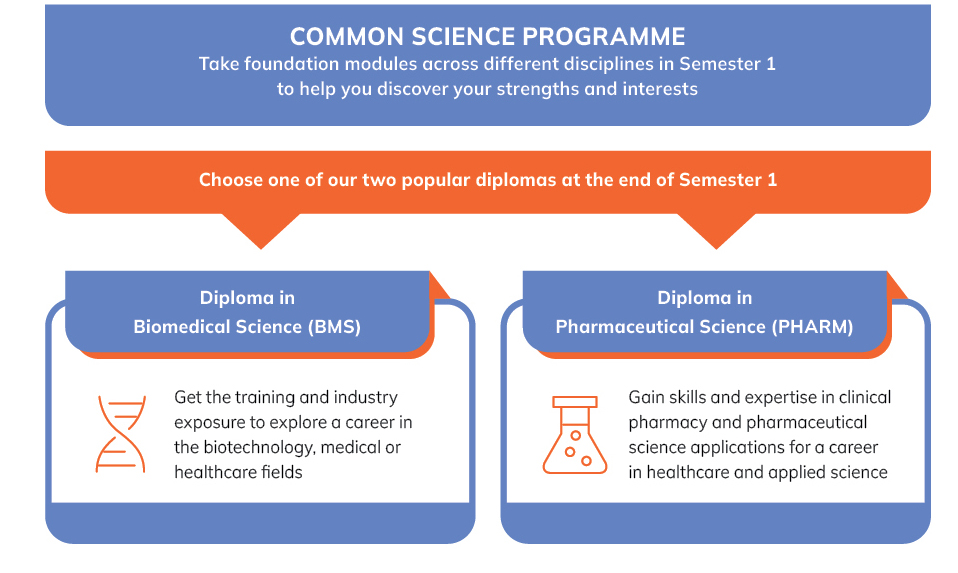Why CSP?
- Gateway to 2 reputable diplomas – Biomedical Science & Pharmaceutical Science
- Gain industry-relevant skills to explore a career in the pharmaceutical or biopharmaceutical fields
- Through exciting experiential learning activities and industry exposure opportunities, our unique Diploma Exposure Programme will help you make an informed course choice at the end of the first semester
About CSP
Interested in science and healthcare, but not sure which
route to take? Choose our Common Science Programme
(CSP) to gain a deeper understanding of the biomedical
and pharmaceutical sectors in your first semester.
Through curated experiences – such as insightful
foundation modules and industry visits – you will
discover your interests and the exciting career
possibilities in these sectors. This will help you make
an informed decision on which diploma suits you.
You will take foundational modules in cell biology and
genetics, inorganic and physical chemistry, as well as
biosafety and biosecurity practices.
In addition, you will earn the bizSAFE Level 2
Certification in essential workplace safety.
Also, look forward to workshops with hands-on
learning, complemented by interactive e-learning
activities in the Diploma Exposure Programme.
What’s more, our Career & Professional Preparation
module will help you discover your strengths
and career goals. At the end of this foundation
semester, choose either the Biomedical Science or
Pharmaceutical Science diploma – both of which will
open doors to rewarding career pathways!
Overview of Your CSP Journey

Further Studies
Click here to view the Further Studies options for BMS.
Click here to view the Further Studies options for PHARM.
Careers
Click here to view the Career Options for BMS.
Click here to view the Career Options for PHARM.
Entry Requirements
AGGREGATE TYPE ELR2B2-C
To be eligible for consideration, candidates must have the following GCE ‘O’ Level examination (or equivalent) results.
| Subject | 'O' Level Grade |
|---|---|
| English Language | 1-7 |
| Additional Mathematics/Mathematics | 1-6 |
| Any one of following subjects: Biology Biotechnology Chemistry Food & Nutrition / Nutrition & Food Science Physics Science (Chemistry, Biology) Science (Physics, Biology) Science (Physics, Chemistry) | 1-6 |
Applicants must also fulfil the aggregate computation requirements for the ELR2B2-C Aggregate Type ( English Language, 2 relevant subjects and 2 other best subjects) listed at www.np.edu.sg/docs/ELR2B2.pdf.
Candidates with colour vision deficiency may encounter difficulties meeting the course requirements and expectations.
What You Will Learn
Biosafety & Risk Management (2 Credit Units)
This module provides the overview of biosafety and biosecurity principles and practices. Students will acquire the knowledge and skills for following good biosafety practices. Topics covered include risk assessment & management of biological hazards, biosafety standards, guidelines and legislations. On completion of the module students will be able to follow biosafety and biosecurity principles and practices, and to interpret biosafety standards, guidelines and legislations.
Career & Professional Preparation I (1 Credit Unit)
This first-year module gives students a foundational introduction to their three-year diploma course curriculum and how it prepares them for industry. It will help them embark on their course with the end in mind. This is achieved through guided reflection of their personal characteristics and the development of an overall game plan for their education and career goals. The module aims to deepen students’ commitment to the sector that the course prepares them for.
Cell Biology & Genetics (4 Credit Units)
This module explores mammalian cells, tissue and organ systems. Topics include the fundamental chemicals of life, structure and function of cellular organelles, membrane trafficking, cell cycle and division, study of genes, genetic variation and heredity.
Inorganic & Physical Chemistry (5 Credit Units)
The principles of physical chemistry, inorganic compounds and their reactions are presented to provide sufficient background knowledge and understanding of chemistry required for other subjects taught in the diploma course. The module covers the structure of matter, electronic structure, stoichiometry, periodic table chemical bonding, redox reactions, thermochemistry, kinetics, chemical equilibrium, and chemistry of solutions, including acids, bases and buffers and their applications.
Mathematics (3 Credit Units)
This module provides students with a fundamental analytical knowledge of mathematics essential for the study of biomedical and pharmaceutical science. Students will learn the concepts of functions, exponential and logarithmic functions, differentiation and its applications, integration and its applications, and differential equations.
Innovation Made Possible^ (3 Credit Units)
